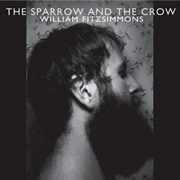The Sparrow and the Crow
- Folk/Pop
- 2009
- Buy the CD
Reviewed by Jeff Giles
()
Given that neither of Fitzsimmons’ first two albums were exactly cheerful, it’s a little troubling to read that Crow was inspired by his recent divorce – song titles like "Further from You" and "You Still Hurt Me" promise to make the hushed, haunted overtones of previous efforts sound like party anthems – but surprisingly, although this is obviously a collection steeped in pain, it’s leavened by a strong undercurrent of hope. This is accomplished partially through various sonic illusions – Crow is layered with warm, live instrumentation, injecting the songs with a soothing humanity absent from the more heavily programmed Goodnight – but mostly, it’s just a shockingly, painfully honest look at the wreckage of a relationship; one that refuses to assign blame or dwell on who did what to whom. It’s an emotional hollowing-out of sorts.
The divorce album is a grand rock ‘n’ roll tradition, one that has yielded a disconcerting number of bona fide classics – but more often than not, these albums are exercises in catharsis; they generally exist to help the artist point fingers, and although they usually have an uplifting number or two tacked on at the end, anger tends to be the predominant theme. In contrast, The Sparrow and the Crow finds Fitzsimmons unpacking his pain like a suitcase, laying all of it out for everyone to see. In places, it almost transcends honesty, reaching a level of awkwardness rarely felt outside reality television – when was the last time you heard a line as squirm-inducingly specific as "I haven’t seen you for over a year / I heard you were married and the baby you carried isn’t mine / I don’t suppose that you’ll still have my name / You’ll have another because you’re not my lover anymore"?
Still, somehow, what looks on paper like wallowing ends up sounding almost joyous in places. It really helps that Fitzsimmons has opened up his arrangements here; the various instrumental and production touches – especially the addition of female counterpoint vocals in spots – help add perspective to what might otherwise sound like the quiet howling of a man being driven insane by loss. More than anything, though, the album benefits from Fitzsimmons himself -- specifically, the way he manages to balance the pain he’s been dealt with the peace he’s managed to find. Beauty never sounded so bittersweet.
You can follow us on Twitter and Facebook for content updates. Also, sign up for our email list for weekly updates and check us out on Google+ as well.













